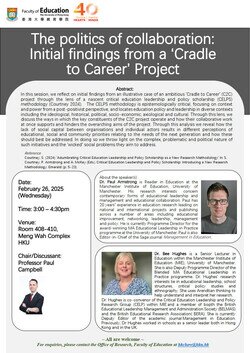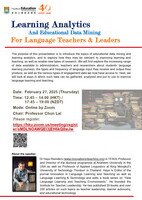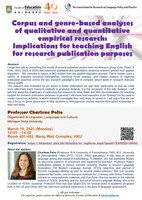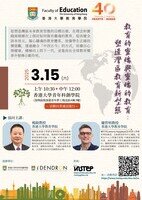Seminar: The politics of collaboration: Initial findings from a ‘Cradle to Career’ project
Seminar
Date
February 26, 2025 (Wed)
Venue
Time
3:00 PM - 4:30 PM
Speaker

The politics of collaboration: Initial findings from a ‘Cradle to Career’ project
February 26, 2025 (Wednesday)
3:00-4:30pm
Room 408-410, Meng Wah Complex, HKU
Chair/Discussant:Professor Paul Campbell
Abstract:
In this session, we reflect on initial findings from an illustrative case of an ambitious ‘Cradle to Career’ (C2C) project through the lens of a nascent critical education leadership and policy scholarship (CELPS) methodology (Courtney 2024). The CELPS methodology is epistemologically critical, focusing on context and power from a post-positivist perspective, and locates education policy and leadership in diverse contexts including the ideological, historical, political, socio-economic, axiological and cultural. Through this lens, we discuss the ways in which the key constituents of the C2C project operate and how their collaborative work at once supports and hinders the overarching aims of the project. Through this analysis we reveal how the lack of social capital between organisations and individual actors results in different perceptions of educational, social and community priorities relating to the needs of the next generation and how these should best be addressed. In doing so we throw light on the complex, problematic and political nature of such initiatives and the ‘wicked’ social problems they aim to address.
The C2C project itself commenced in 2019 and is located within a small urban area (in the North of England where poverty is high with over 50% of children living in low-income families. the project aims to ‘join-up’ local service infrastructure in ways that holistically support the educational and life trajectories of young people in this locality (encompassing their safety, material well-being, living conditions, personal and social development, health, education, and future career and employment prospects). The idea is to create a ‘pipeline of support’, where a comprehensive, integrated provision for children and their families are ‘wrapped around’ a seamless, high-quality education offer, spanning pre- to post-school provision. As members of a University of Manchester research team (evaluating the entire project over a three-year period 2023-2026), we have been working with and exploring the role of key actors involved in the project including pupils, teachers and leaders from eight local schools, a multidisciplinary team, and various voluntary/community sector organisations. In the first year, after an initial scoping exercise, we undertook interviews and focus groups with key stakeholders and set up a field-based initiative entitled Welcoming Schools. A social network analysis has also been completed. Early findings reveal the complex, political and problematic nature of such initiatives.
Reference
Courtney, S. (2024) ‘Adumbrating Critical Education Leadership and Policy Scholarship as a New Research Methodology’ In S. Courtney, P. Armstrong and A. McKay (Eds.) Critical Education Leadership and Policy Scholarship: Introducing a New Research Methodology. Emerald (p. 5-23)
About the speaker(s):
Dr. Paul Armstrong is Reader in Education at the Manchester Institute of Education, University of Manchester. His research interests concern contemporary forms of educational leadership and management and educational collaboration. Paul has 20 years’ experience in education research leading on national and international projects and publishing across a number of areas including educational improvement, networking, leadership, management and policy. He is currently Programme Director for the award-winning MA Educational Leadership in Practice programme at the University of Manchester. Paul is also Editor-in-Chief of the Sage journal Management in Education.
Dr. Bee Hughes is a Senior Lecturer in Education within the Manchester Institute of Education (MIE), University of Manchester. She is also Deputy Programme Director of the Blended MA Educational Leadership in Practice programme. Dr Hughes' research interests lie in educational leadership, school structures, critical policy studies and ethnography. She uses Arendtian thinking to help understand and interpret her research. Dr Hughes is co-convenor of the Critical Education Leadership and Policy Research Group (CELP) within MIE and a member of bopth the British Educational Leadership Management and Administration Society (BELMAS) and the British Educational Research Association( BERA). She is currently Deputy Editor of the academic journal Management in Education. Previously, Dr Hughes worked in schools as a senior leader both in Hong Kong and in the UK.
~ All are welcome ~



